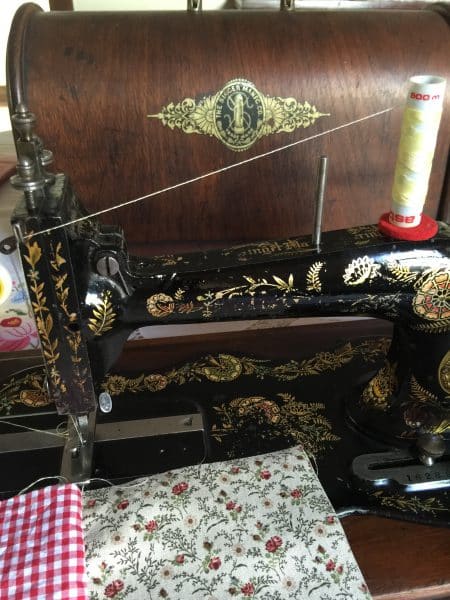Singer Castle on Dark Island
Hello Dear Friends and Readers and a warm welcome to today’s post. Today I would like to share with you an interesting journey I have had recently which relates to sewing machines..
I believe I have been incredibly fortunate to see something that I never thought I would see in my life, as this site is only accessible by sea! By sheer coincidence, towards the end of my holiday, we sail down the Saint Lawrence Seaway, which traverses Canada and the USA. During that journey, we went through seven locks which each incrementially raise the ship to go up the seaway which sounds so counterintuitive and was absolutely fascinating. The ship was such a tight fit that I could actually touch the sides of the locks as we were passing through.
Thousand Islands
Passing through each lock higher and higher in the seaway until eventually we came to an area called Thousand Islands, (Origin of Thousand Island Dressing https://en.wikipedia.org/wiki/Thousand_Island_dressing
Thousand Islands was absolutely stunning. I never could have imagined there was such a beautiful place. We sailed along the seaway blessed by a beautiful warm sunny day with lots of onlookers waving and enjoying their holidays in their summer houses, and boats. To my joy and surprise, we also passed, the famous Singer Castle. This castle I believe was built with some of the proceeds of the Singer Empire started by Isaac Singer. https://sewalot.com/singer_history.htm
I’m going to share some photos with you of this beautiful spot and a little bit of brief history about how it came to be there.
Fifth President of the Singer Corporation
This amazing castle in the area of a Thousand Islands was not built by Isaac Singer. Apparently it was built by the fifth president of the Singer Sewing Machine Company. He built it for his family to enjoy in the summer. Seeing this building and its location seems to me that it would’ve been a mammoth undertaking to, bring all the materials in the middle of this seaway to make this amazing island getaway. It apparently houses secret tunnels ands it’s own boathouse,
Here is a link to a an article about how this came to be https://www.singercastle.com/brief-history/
I believe Isaac Singer was responsible for creating a type of credit called Installment Credit Plans. https://www.britannica.com/biography/Isaac-Singer in order to purchase sewing machines.
Sewing machines were so expensive in this era that required approximately six months wages in order to afford a sewing machine. Therefore he invented a program where you could purchase the sewing machine and gradually pay it off. Of course, having a sewing machine made a huge difference to women of the day because it could enormously improve, the efficiency and capability of making so many household goods. I can’t imagine having to make all the linen and clothing and drapery for a whole family along with all the normal chores that go along with running a household and looking after people.
Which leads me to say that, that accounts for the massive amount of money required to create such an impressive castle, I did not go into the castle, but merely observed it as a passer by. However, I feel like that was the most visually impressive part of it anyway. I gather that they still have some sewing machines inside the castle, but I don’t know what kind or how many they actually are.
I hope you enjoyed seeing these photos. As I said, it’s something I never imagined I would see in my lifetime.
I have always enjoyed the appearance and use of antique and vintage sewing machines. One of the reasons I’ve chosen to collect more of the Singer sewing machines, is because it is easier to get parts as they are so ubiquitous throughout the world. Having said that, here is one of mine which is lovely however, these are hard to get needles for. Singer 12 Circa 1899. I do love the decals on this hand crank.
Thank you for joining me today on this little episode of my recent travels. We finally sailed into Toronto, Canada in the early hours of the morning so I will leave you with this beautiful photo.
If you enjoy this post and you are also a sewing machine enthusiast you may also like these Singer sewing machine related posts.
Singer 31K20 Treadle – Free Motion Quilting
Make Your Singer Sing (Part 1)
As always, wherever you are today, happy stitching.
Susie
© Susan Stuklis 2024







